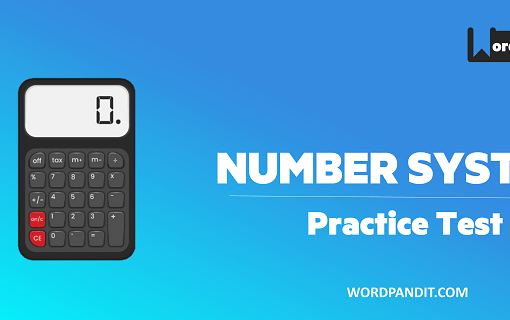- This is an assessment test.
- To draw maximum benefit, study the concepts for the topic concerned.
- Kindly take the tests in this series with a pre-defined schedule.
Number System Basics: Test-6
Congratulations - you have completed Number System Basics: Test-6.You scored %%SCORE%% out of %%TOTAL%%.You correct answer percentage: %%PERCENTAGE%% .Your performance has been rated as %%RATING%%
Your answers are highlighted below.
Question 1 |
Which of the following statement is correct?
(+ve) x (-ve) + (-ve) x (-ve) x (-ve) (+ve)+(-ve)+(-ve)= (-ve) | |
(-ve)(-ve) + (-ve)(+ve)= +ve | |
(ve)(odd) x (-ve)(Even) = (-ve) | |
None of these |
Question 1 Explanation:
Let us solve by using the following the values;
Option A = 2 x(-3)+(-1)x(-4)x(-1)(+2)+(-1)+(-1)= -16
Option B = In B, two outcomes are possible. If the power of –ve number is
even then the value will come positive and if the power is odd then value will come negative.
Therefore, we cannot say the number will be positive only.
Option C = Again the power of negative number is even so the result will become in positive number
So, this is an incorrect statement.
So the right answer is option a
Answer will be a only.
Option A = 2 x(-3)+(-1)x(-4)x(-1)(+2)+(-1)+(-1)= -16
Option B = In B, two outcomes are possible. If the power of –ve number is
even then the value will come positive and if the power is odd then value will come negative.
Therefore, we cannot say the number will be positive only.
Option C = Again the power of negative number is even so the result will become in positive number
So, this is an incorrect statement.
So the right answer is option a
Answer will be a only.
Question 2 |
If x= -0.5, then which of the following has the smallest value
2 1/x | |
1/x | |
1/x2 | |
2x |
Question 2 Explanation:
Option A has a positive number raised to any power will always be positive.
Hence it is a positive number. Option B is a negative number.
Option C is again a positive number as it squares a negative number.
Option D follows the same logic as option A.
Hence, option B is the correct answer.
Hence it is a positive number. Option B is a negative number.
Option C is again a positive number as it squares a negative number.
Option D follows the same logic as option A.
Hence, option B is the correct answer.
Question 3 |
If a three digit number having no zero, "abc" is divisible by 3 and another three digit number "acb' is divisible by 6, then what is the minimum value of a+b+c?
12 | |
6 | |
15 | |
none |
Question 3 Explanation:
Since abc is divisible by 3 hence a+b+c must be divisible by 3.
Now acb is divisible by 6 that means the number abc is an even number
because for it to be divisible by 6, it should be divisible by 2 and 3 first.
The minimum value of three digit number abc=123,and the acb=132.
So the sum of digits is 6.
So the right answer is option b.
Now acb is divisible by 6 that means the number abc is an even number
because for it to be divisible by 6, it should be divisible by 2 and 3 first.
The minimum value of three digit number abc=123,and the acb=132.
So the sum of digits is 6.
So the right answer is option b.
Question 4 |
Consider a four digit number whose first two digits are same and last two digits are same , how many such numbers are perfect square ?
0 | |
1 | |
3 | |
4 |
Question 4 Explanation:
There is only number in the Universe which has the given condition the number is square of 88 = 7744
Question 5 |
If a2=123456787654321, then what is a
1234 | |
54321 | |
11111 | |
11111111 |
Once you are finished, click the button below. Any items you have not completed will be marked incorrect.
There are 5 questions to complete.
List |













